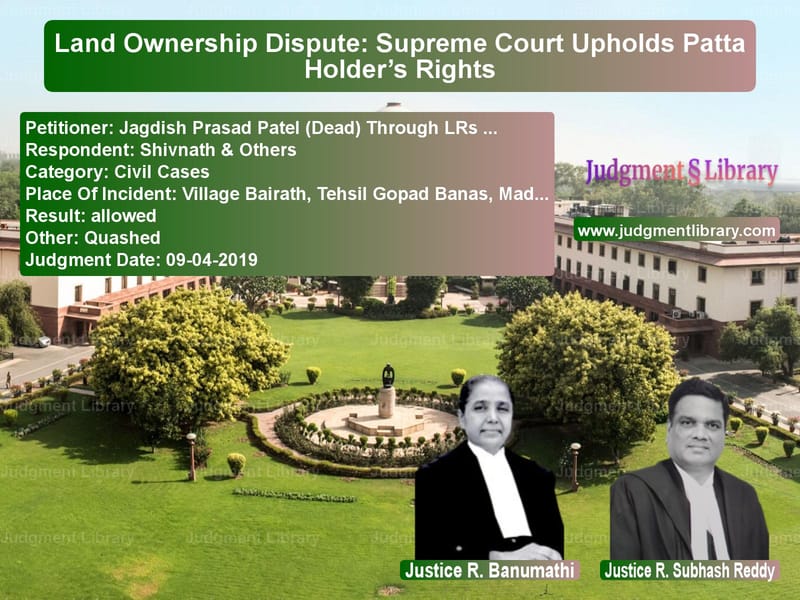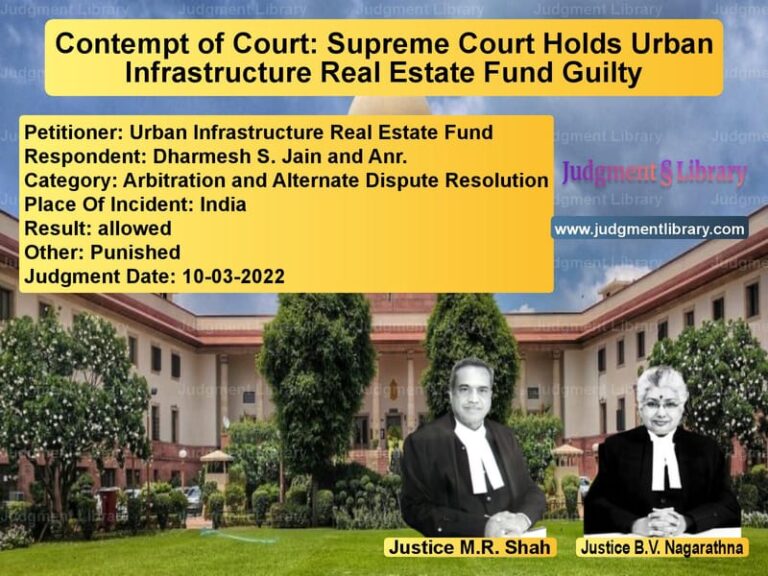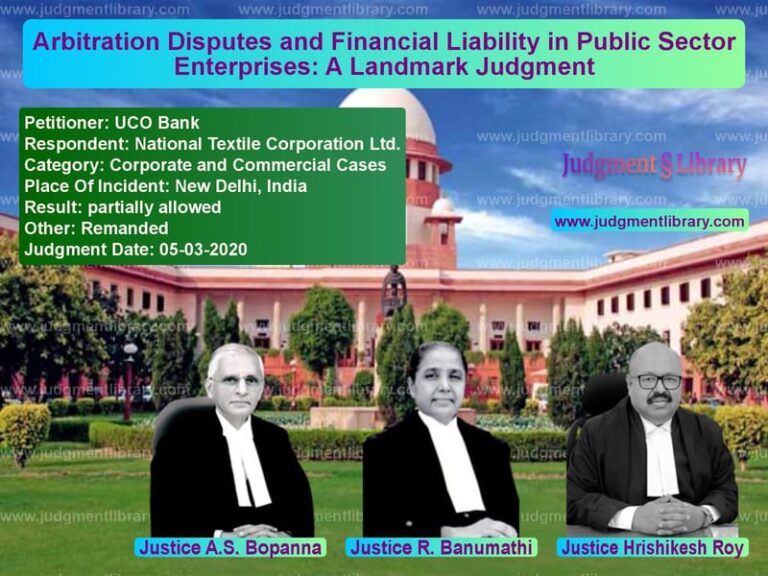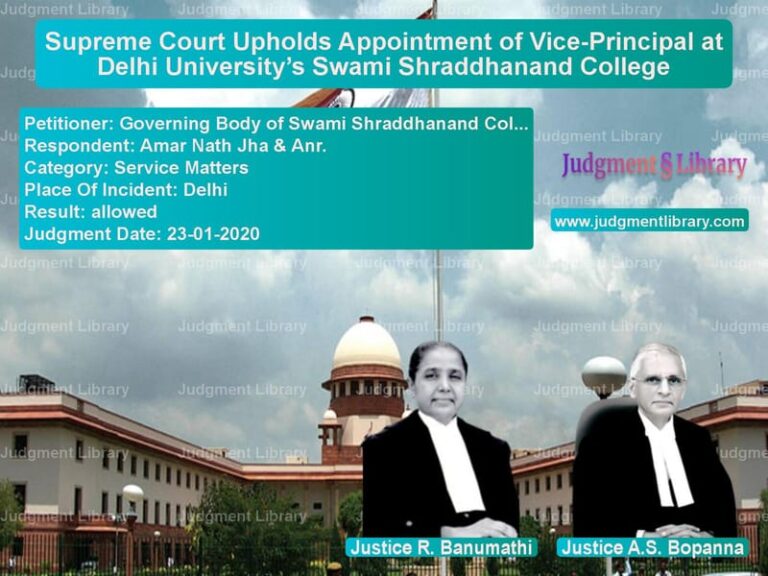Land Ownership Dispute: Supreme Court Upholds Patta Holder’s Rights
The Supreme Court of India has ruled in favor of the appellants in a long-standing land dispute, overturning the High Court’s decision and restoring the trial court’s judgment. The case revolved around the ownership and possession rights of agricultural land in Madhya Pradesh, with competing claims between the heirs of the original patta holders and subsequent occupants.
Background of the Case
The case originated from a legal dispute over agricultural land in Village Bairath, Tehsil Gopad Banas, Madhya Pradesh. The respondents, Shiv Nath and Vishwanath (now deceased), filed a suit seeking a declaration of title and possession over the disputed land, claiming that their fathers were granted patta (lease) rights decades ago and had been cultivating the land until they were allegedly dispossessed by the appellants.
The appellants, on the other hand, contended that the land had been legally allotted to their forefather, Gaya Din, through a valid lease in 1929. They argued that their family had continuously possessed and cultivated the land since then, and any competing claims were based on fabricated records.
Initially, the trial court ruled in favor of the appellants, affirming that they held legitimate title over the land through the 1929 patta. However, this decision was overturned by the first appellate court and subsequently upheld by the High Court, leading to the present appeal before the Supreme Court.
Key Issues in the Case
- Whether the respondents’ ancestors had a valid claim to the land through a patta issued during the settlement period.
- Whether the appellants’ claim of continuous possession and cultivation since 1929 was legally valid.
- Whether the lower courts erred in disregarding critical revenue records and past administrative decisions.
- Whether the respondents’ suit was barred by the limitation period.
Arguments Before the Supreme Court
Appellants’ Contentions:
- The appellants argued that their forefather, Gaya Din, was legally granted a patta in 1929, and this was confirmed through multiple revenue records and government orders.
- They contended that the respondents’ ancestors had abandoned the land, and any claim of continued ownership was without merit.
- They presented revenue records showing that their family had been recorded as cultivators since the early 1950s.
- The appellants cited administrative orders, including a 1973 Commissioner’s report, confirming that fraudulent entries had been made in the revenue records to favor the respondents.
- They contended that the respondents’ suit was filed decades after the disputed possession began and was therefore barred by limitation.
Respondents’ Counterarguments:
- The respondents argued that their ancestors were the original patta holders and that the grant to Gaya Din was obtained fraudulently.
- They relied on earlier revenue records from the 1950s that mentioned their forefathers as lessees of the land.
- They claimed that the appellants’ possession of the land was unlawful and that they had taken possession by force.
- The respondents disputed the authenticity of the appellants’ revenue records, alleging they were manipulated.
Supreme Court’s Observations
The Supreme Court carefully examined the documentary evidence, including past revenue records, patta documents, and administrative orders. It made several key observations:
- “The respondents have failed to produce the original patta document, and their reliance on partial revenue records is insufficient to establish ownership.”
- “The appellants have presented substantial evidence, including revenue records from 1929 and multiple official reports, proving continuous possession and cultivation.”
- “The Commissioner’s order from 1973 clearly indicates that fraudulent revenue entries were made to favor the respondents, raising serious doubts about their claims.”
- “As per the Vindhya Pradesh Abolition of Jagirs and Land Reforms Act, 1952, the appellants’ ancestor was a legally recognized tenant, and his rights were protected under subsequent land reforms.”
- “The respondents’ claim is barred by limitation since they failed to challenge the appellants’ possession for over 50 years.”
The Court emphasized that in a suit for declaration of title, the burden of proof lies with the plaintiffs. Since the respondents failed to provide conclusive evidence of their ownership, their claim could not be upheld.
Final Judgment
The Supreme Court set aside the High Court’s judgment and reinstated the trial court’s ruling in favor of the appellants. It stated:
“The first appellate court and the High Court erred in not considering critical revenue documents and past administrative decisions. The appellants have sufficiently demonstrated their lawful title and continuous possession. The respondents’ suit is therefore dismissed.”
Conclusion
This judgment reaffirms the principle that land ownership disputes must be settled based on strong documentary evidence and historical records. It highlights the importance of adhering to statutory land reforms and the need for claimants to act within the legal limitation period. The ruling serves as a precedent for similar cases where long-standing land ownership is contested.
Petitioner Name: Jagdish Prasad Patel (Dead) Through LRs & Another.Respondent Name: Shivnath & Others.Judgment By: Justice R. Banumathi, Justice R. Subhash Reddy.Place Of Incident: Village Bairath, Tehsil Gopad Banas, Madhya Pradesh.Judgment Date: 09-04-2019.
Don’t miss out on the full details! Download the complete judgment in PDF format below and gain valuable insights instantly!
Download Judgment: Jagdish Prasad Patel vs Shivnath & Others Supreme Court of India Judgment Dated 09-04-2019.pdf
Direct Downlaod Judgment: Direct downlaod this Judgment
See all petitions in Property Disputes
See all petitions in Succession and Wills
See all petitions in Landlord-Tenant Disputes
See all petitions in Judgment by R. Banumathi
See all petitions in Judgment by R. Subhash Reddy
See all petitions in allowed
See all petitions in Quashed
See all petitions in supreme court of India judgments April 2019
See all petitions in 2019 judgments
See all posts in Civil Cases Category
See all allowed petitions in Civil Cases Category
See all Dismissed petitions in Civil Cases Category
See all partially allowed petitions in Civil Cases Category







